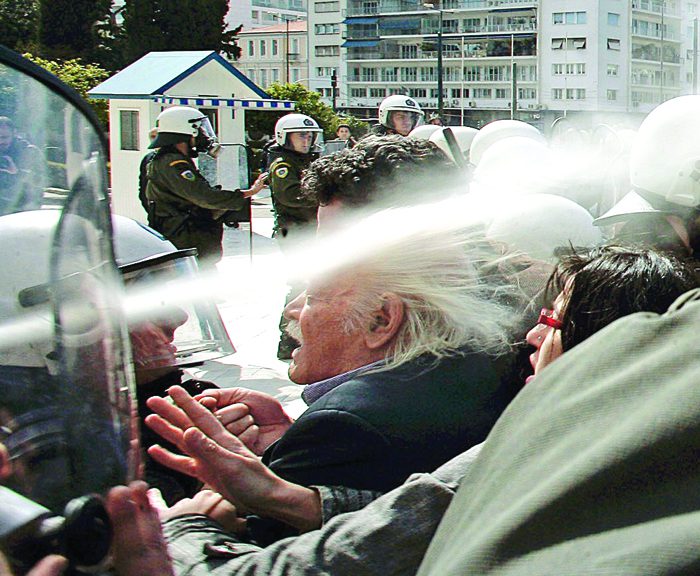Downtown Athens was paralysed once again on Friday when thousands of Greeks took to the streets to protest against the country’s newly announced package of austerity measures.
Angry protestors, organised by trade unions, gathered in front of the parliament building as discussed the additional austerity measures which the Greek government proposed on Wednesday.
More than 10,000 people converged on central Syntagma Square in the morning for a rally organised by the Communist-affiliated labour union PAME which ended peacefully shortly after noon.
Together with four-hour work stoppages called by the main labour union GSEE and the civil servants’ union ADEDY, the action halted public transport services, closed down schools and disrupted hospitals.
In the early afternoon, a smaller rally, organised by the country’s two largest unions – the main labour union GSEE and the civil servants’ union ADEDY – was marred by outbreaks of violence by demonstrators who squared up against riot police officers, throwing stones and other objects.
Police fired tear gas to disperse them and the ensuing scuffles led to at least five arrests and seven policemen being injured.
“We will become their crisis,” workers chanted, holding banners and flags of the country’s two main trade unions covering both the public and private sectors.
Among the injured at the rally was GSEE head Giannis Panagopoulos, who was attacked by a group of protesters while he was about to address the crowd. He was transferred to a nearby hospital for first-aid treatment.
Panagopoulos had announced a few hours earlier that a new 24-hour nationwide strike in the public and private sectors, as well as another rally, would be held on March 11.
On March 8, tax office employees will call for a 48-hour strike, while a union aligned with the Communist Party of Greece plans a new rally.
Manolis Glezos, a widely respected politician who tried to intervene when the first clashes broke out, was transferred to hospital with Panagopoulos, due to respiratory problems caused by tear gas.
Glezos is a symbol of resistance against Nazi occupation of Greece during World War II, when he raised a Greek national flag on the Acropolis hill.
Due to the four-hour stoppage in various public and private organizations and the 24-hour strike in public transport, dozens of flights were cancelled and buses, subway and rail services were shut down, as were most schools. Hospitals ran emergency sections only.
In one more symbolic effort to stop the implementation of the measures, a group of protesters on Friday occupied the building of the National Printing House, so that the bill cannot be printed.
Nine out of 10 public sector employees reject the cutbacks on the 14th salary and allowances, according to a poll conducted for the SKAI television channel, published Friday.
Seventy-six percent of the private sector workers opposed the austerity measures while 68 percent of the country’s pensioners objected to pension freezes for this year and 61 percent of employers believed the measures were not in the right direction.
Sixty-two percent of the respondents expressed fear that there might be social unrest in Greece because of the economic crisis.









